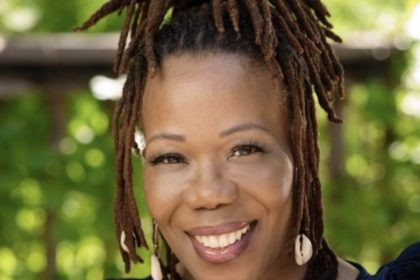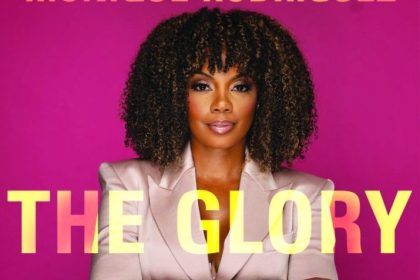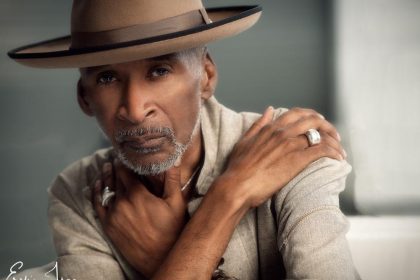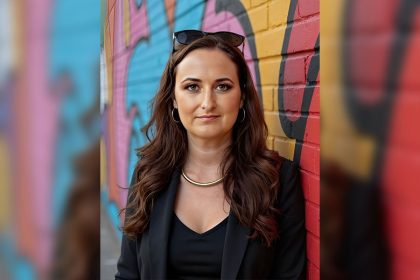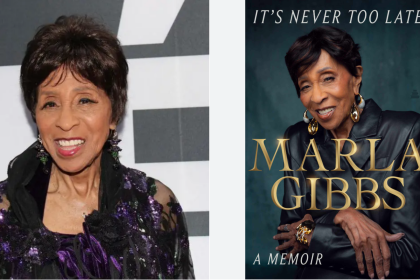
In an era where conversations about intergenerational trauma and systemic inequities are gaining momentum, Chicago’s Veronica Harrison stands at the forefront with her powerful book Hood Healing. On May 18, Harrison made history by bringing her message behind the walls of Danville Correctional Center, becoming the first author invited since 200 books focused on Black issues were removed from the facility in 2019 for being “racially charged.”
This pivotal visit represents both a restoration of voice and a reclamation of space in a system that has historically silenced marginalized narratives. Harrison’s work, which examines the intersection of intergenerational trauma, public policy, and growing up on Chicago’s West Side, offers not just critique but solutions for communities struggling with the long-lasting impacts of historical injustice.
What inspired the writing of Hood Healing and how did your own upbringing shape the narrative?
I grew up on the West Side of Chicago, and it is always and has always been a part of my life. I am in a situation now where I’m raising my own children, but in my upbringing in the city I saw and learned so much at a very, very young age. I realized that stories were trapped inside of Black people, that we could not tell, so I’m excited to be a journalist telling those stories right now.
How would you describe the core message of the book?
Hood Healing is really about intergenerational trauma, how we are living with trauma inside of us, since our own people, Black people were enslaved 300 years ago. How does this impact what’s happening on the streets right now? Why are we so angry? Why is our music so euphoric? Why don’t we know the good foods to eat, to heal and nourish us? All of these things were taken away when our people were brought over here on those slave ships. We don’t realize that the residuals of slavery are still inside of us.
It’s about the passing on of trauma. And what I realized was happening to me through my own parents, and what I realized as a parent I was doing to my children. So putting an understanding around intergenerational trauma, and how we can heal from that. That’s the basis of the book.
Why is addressing intergenerational trauma so important to finding peace in our communities?
Because I know it sounds so cliché, but it starts in our home. It really does. We want to continue to blame politics and policy. Hood Healing tells my story of what happened in my home, how that intergenerational trauma came from my dad having an addiction, my mom being a teenage mom and being kicked out of her house. All of these things inside of my home, despite a college degree, despite being an honor roll student has had and continues to have an intense impact on me.
It doesn’t matter how you try to escape it. It has to be dealt with. And when we’re talking about the book, and we’re talking about the truth, we’ve grown up in families. I know you and I can relate with Black mamas or Black daddies don’t tell people what’s going on outside of my house. We don’t do that. And because we keep these intergenerational traumas secret, they’re forever trapped inside of us.
They play out in our relationships, at our jobs, through our careers, we start realizing we’re battling anger issues, mental health things that have gone undiagnosed because we’ve been keeping secrets. So it’s a way to sound the alarm and talk about it, but also be about it, because, like I mentioned to you, I was on my high horse chapters one through four, but chapter five, I give you some solutions, and it’s in the book.
What did it mean for you to bring Hood Healing into Danville Correctional Center?
It was a powerful experience. I’m talking grown men older than me, younger men younger than me, who are in there for life or for a very long time, but some of them are brilliant minds. My entire point of Hood Healing was creating some empathy around trauma, creating an understanding that it’s our common thread.
Were there any stories that you heard during your visit to Danville that stuck with you that you want to share?
There was a gentleman in there, an older man in his late 40s, who told me he had a son out there. His son was doing everything, going to school, getting good grades. Coming home. His mama was reporting back. He was doing well at home. Son got killed when he was in there. Since he’s been in there. It’s very fresh, not even a month. This gentleman cried on me like a newborn baby about the son.

